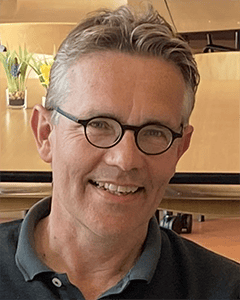Keynote Lecture: Pieter R. Roelfsema
View Livestream
Friday, August 15, 5:00 – 6:00 pm, Room A0.01, Overflow Rooms A1.02, A1.03, C1.03
Brain mechanisms for conscious visual perception of coherent objects and the technology to restore it in blindness
Pieter R. Roelfsema
Netherlands Institute for Neuroscience, Amsterdam; Institute de la Vision, Paris
Dr. Roelfsema will discuss the mechanisms that determine whether a weak visual stimulus will reach consciousness or not. If the stimulus is simple, early visual cortex acts as a relay station that sends the information to higher visual areas. If the stimulus arrives at a minimal strength, it will be stored in working memory. However, during more complex visual perceptions, which for example depend on the segregation of a figure from the background, early visual cortex’ role goes beyond a simple relay. It acts as a cognitive blackboard and conscious perception depends on it. Our results also inspire new approaches to create a visual prosthesis for the blind, by creating a direct interface with the visual brain. I will discuss how high-channel-number interfaces with the visual brain can be used to restore a rudimentary form of vision in blind individuals.
Pieter R. Roelfsema received his MD degree in 1991 and his PhD degree in 1995. He moved to the Netherlands Institute for Neuroscience in Amsterdam in 2002 where he was director between 2007 and 2023. He is professor at the Vrije Universiteit and at the Neurosurgery Dept. of the Amsterdam University Medical Center in Amsterdam. He received a NWO-VICI award (2008) and two ERC-Advanced grants (2014 and 2022). Roelfsema studies visual perception, plasticity, memory and consciousness in the visual system of experimental animals, humans, and with neural networks, examining how neurons in different brain areas work together during seeing and thinking and how networks of neurons configure themselves during learning. He develops the neurotechnology for visual prostheses for blind people, aiming to restore a rudimentary form of sight. Roelfsema coordinates the Dutch neurotechnology initiative NeuroTech-NL. In 2019 he co-founded the start-up company Phosphoenix that aims to develop a visual brain prosthesis for blind people.